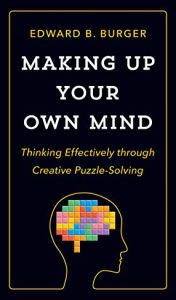
Book
Making Up Your Own Mind
Thinking Effectively Through Creative Puzzle-Solving
We currently cannot offer you an audio version of this summary.
Recommendation
Edward Burger, president of Southwestern University, developed a 100-page course that aims to slow down your thinking and help you think through ideas. He lays out 25 challenging puzzles and guides you through solving them without revealing the answers. You may find Burger’s puzzles and hints either challenging or vexing, but he will inspire you to get up, walk around, ponder and puzzle. Those with the patience to practice and reflect will appreciate Burger’s unique work.
Summary
About the Author
Southwestern University president Edward B. Burger designed a course around these thinking practices through entertaining puzzles, which he teaches as a mathematics professor at Southwestern.










Comment on this summary